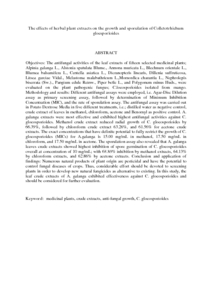Citation
Johnny, Lucy and Yusuf, Umi Kalsom and Nulit, Rosimah
(2010)
The effects of herbal plant extracts on the growth and sporulation of Colletotrhichum gloesporioides.
Journal of Applied Biosciences, 34.
pp. 2218-2224.
ISSN 1997-5902
Abstract
Objectives: The antifungal activities of the leaf extracts of fifteen selected medicinal plants; Alpinia galanga
L., Alstonia spatulata Blume., Annona muricata L., Blechnum orientale L., Blumea balsamifera L., Centella asiatica L., Dicranopteris linearis, Dillenia suffruticosa, Litsea garciae Vidal., Melastoma malabathricum L.,Momordica charantia L., Nephrolepis biserrata (Sw.)., Pangium edule Reinw., Piper betle L., and Polygonum minus Huds., were evaluated on the plant pathogenic fungus; C.loeosporioides isolated from mango.
Methodology and results: Different antifungal assays were employed, i.e. Agar-Disc Dilution assay as primary screening assay, followed by determination of Minimum Inhibition Concentration (MIC), and the rate of sporulation assay. The antifungal assay was carried out in Potato Dextrose Media in five different treatments, i.e.; distilled water as negative control, crude extract of leaves in methanol, chloroform, acetone and Benomyl as positive control. A. galanga extracts were most effective and exhibited highest antifungal activities against C. gloeosporioides. Methanol crude extract reduced radial growth of C. gloeosporioides by 66.39%, followed by chloroform crude extract 63.26%, and 61.56% for acetone crude extracts. The exact concentrations that have definite potential to fully restrict the growth of C. gloeosporioides (MICs) for A.galanga is 15.00 mg/mL in methanol, 17.50 mg/mL in chloroform, and 17.50 mg/mL in acetone. The sporulation assay also revealed that A. galanga leaves crude extracts showed highest inhibition of spore germination of C. gloeosporioides overall at concentration of 10 mg/mL; with 68.89% inhibition by methanol extracts, 64.13% by chloroform extracts, and 62.86% by acetone extracts.
Conclusion and application of findings: Numerous natural products of plant origin are pesticidal and have
the potential to control fungal diseases of crops. Thus, considerable effort should be devoted to screening
plants in order to develop new natural fungicides as alternative to existing. In this study, the leaf crude
extracts of A. galanga exhibited effectiveness against C. gloeosporioides and should be considered for further evaluation.
Download File
![[img]](http://psasir.upm.edu.my/17135/1.hassmallThumbnailVersion/The%20effects%20of%20herbal%20plant%20extracts%20on%20the%20growth%20and%20sporulation%20of%20Colletotrhichum%20gloesporioides.pdf)  Preview |
|
PDF (Abstract)
The effects of herbal plant extracts on the growth and sporulation of Colletotrhichum gloesporioides.pdf
Download (86kB)
| Preview
|
|
Additional Metadata
| Item Type: |
Article
|
| Subject: |
Plant extracts |
| Subject: |
Antifungal agents |
| Subject: |
Medicinal plants |
| Divisions: |
Faculty of Science |
| Publisher: |
FACT Limited |
| Keywords: |
medicinal plants, crude extracts, anti-fungal growth, C. gloeosporioides |
| Depositing User: |
Najwani Amir Sariffudin
|
| Date Deposited: |
30 Jul 2012 03:22 |
| Last Modified: |
08 Oct 2015 07:10 |
| URI: |
http://psasir.upm.edu.my/id/eprint/17135 |
| Statistic Details: |
View Download Statistic |
Actions (login required)
 |
View Item |

